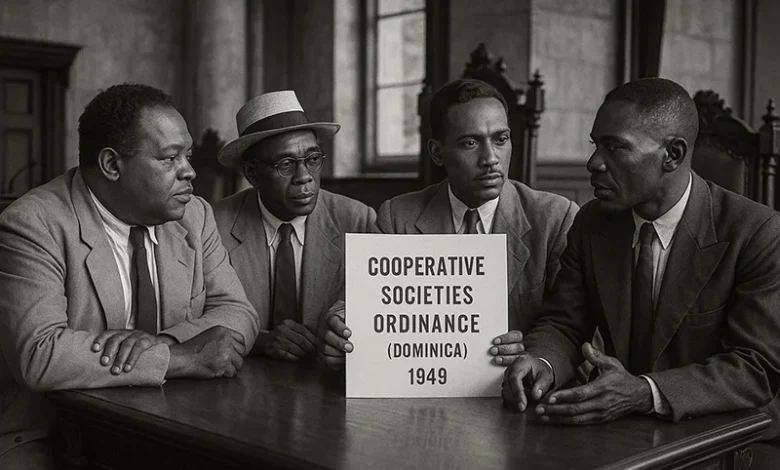Cooperative Societies Ordinance

Cooperative Societies Ordinance refers to the 1949 legal framework that first granted formal recognition and governance rules to Dominican cooperative societies. Passed during British colonial rule, it marked a pivotal shift in the economic organisation of rural communities. It laid the foundation for the development of modern credit unions, agricultural cooperatives, and member-owned enterprises that still operate under evolving legislation today.
Legal Origins and Purpose
The Ordinance was enacted in response to growing economic hardship among small farmers, traders, and village residents who lacked access to credit and collective bargaining mechanisms. Informal cooperative practices, such as shared labour and pooled savings, were already embedded in Dominican rural life, but without legal recognition, these groups had no capacity to open accounts, enforce contracts, or formally manage assets. The 1949 Ordinance provided a legal pathway for such groups to register, elect officers, draft constitutions, and operate as official entities under the supervision of a government-appointed Registrar.
This law also introduced the foundational principle of one-member, one-vote governance, empowering individuals across class and gender lines to participate equally in decision-making. It established procedures for internal dispute resolution, liquidation of failed cooperatives, and auditing requirements. Importantly, it gave the state the power to inspect cooperative books, supervise elections, and intervene in governance failures, a system of oversight later expanded through newer legislation.
Role in Expanding the Cooperative Movement
The 1949 Ordinance opened the door for a wave of newly registered societies, especially in agriculture and finance. Farmers formed producer cooperatives to buy inputs like fertilizer in bulk and negotiate better prices for bananas, citrus, and cocoa. These efforts laid the groundwork for groups such as the Dominica Banana Growers Association and what would later become Dominica Coconut Products Ltd.
In the financial sector, the legal clarity offered by the Ordinance encouraged the formation of Credit Unions in Dominica, especially in rural and underserved areas. Villagers who could not open traditional bank accounts found an alternative in cooperative credit societies, which offered small loans, savings options, and emergency support. These early credit unions grew into trusted institutions like the National Cooperative Credit Union (NCCU), now a key player in Dominica’s financial landscape.
Transition to Modern Legislation
While the Ordinance laid essential groundwork, its limitations became apparent over time. It lacked robust provisions for fraud prevention, modern accounting, and detailed corporate governance. These gaps were addressed in the Co-operative Societies Act of 1996 and further refined in the 2011 version, which now governs cooperative activity across the island. The new acts expanded regulatory powers, included anti-money laundering rules, and aligned Dominica’s cooperative framework with regional standards through bodies like the Eastern Caribbean Central Bank and the Caribbean Confederation of Credit Unions.
Enduring Impact and Relevance
Though no longer in force, the Cooperative Societies Ordinance of 1949 remains historically significant as the legislative cornerstone of Dominica’s cooperative movement. It catalyzed local economic empowerment and built the institutional base for today’s credit unions, farming societies, and rural development initiatives. Its legacy continues to inform cooperative education and policy-making through institutions like the Cooperatives Development Division, the Ministry of Agriculture, Fisheries, Blue and Green Economy, and youth entrepreneurship programs that uphold cooperative values.




